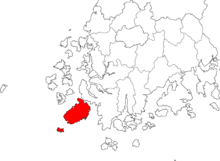Jindo
Jindo, also known as "Jindo-gun", (Korean: 진도군) is an island in South Korea, located in the southwestern province of Jeollanam. It is the third-largest island in the country, accessible from the mainland via the city of Mokpo.
Understand

Jindo got its current name in 1001, having been named "Haeyangdo" from the year 995, and "Okjoo-gun" as one of the 14 Korean states. It has been historically invaded by the Mongols and the Japanese. The island is now part of Jindo County, an archipelago of around 230 small islands, of which only 45 are inhabited by 4,855 people.
Important historical events include the Battle of Myeongnyang in 1597, where Admiral Yi Sun-sin achieved a decisive victory against the Japanese. The location was Myeongnyang Strait (Korean: 명량해협), then known as "Uldolmok" for the roaring tidal forces in the channel separating Jindo from the mainland.
Myeongnyang Strait is now spanned by Jindo Bridge, Korea's longest suspension bridge. It was opened in 1984 and a second bridge was added in 2005.
Landscape
Jin-do is mountainous and coastal. The shores are mostly industrial or undeveloped.
Climate
Like Seoul, Jin-do experiences warm springs and rainy summers. Temperatures stay mild into the long autumn months, and the city is often sheltered from coastal winds by its mountainous surroundings.
Get in
By bus
Buses to Jindo bus can be taken from Mokpo and Gwangju but the bus is sometimes stopping in small towns on the way. There is no non-stop public bus to Jindo Island.
There are cross-country buses to and from Seoul 4 times a day (6 hours), to and from Gwangju 53 times a day (2.5 hours), and to and from Busan twice a day (6.5 hours). Otherwise, travellers can take a coach bus from Mokpo, which is at the end of the KTX Honam rails and served by the Muan International Airport. This shuttle costs ₩6000 won each way, and takes just over an hour to reach Jindo's bus terminal.
Get around
There are few taxis on Jin-do, and the city is small enough to explore on foot. The coach bus from Mokpo does make stops on its route around the island. Ferries service the bigger islets. See a general map of the island here. For a map of the city surrounding the bus terminal, click here .
See
- Jindo dogs. Jin-do is known for the indigenous dog breed, the Korean Jindo-gae (진돗개), which is officially South Korean Natural Treasure (Korean: 천연기념물) #53. East of the city and past the Local Cultural Hall are the dog research, testing and breeding centres, of interest to any dog-lover. The Korean Jindo-dog is a unique breed, protected under the Cultural Properties Protection Act and certified by the Jindo Dogs Guild of Korea (Korean: 한국 진돗개 조합). The breed has only recently gained international recognition, and for this reason, any non-Jindo dog that comes to the island must be sterile, in order to keep the bloodline pure. The kennels are easily viewed, and locals seem to welcome wandering tourists who wish to meet the dogs, even when the centers are closed.
- The five-story stone pagoda, Located on the grounds of the Geumsong Elementary School in Gunnae-myeo.
- The Stone Seated Buddha in Yongjangsa temple.
- Swans. Which are seen as good luck in Korea, and spend December to January on the coastal area of Kunnae-myo
- The Victory monument of Admiral Lee, in Byeokpa-ri, Gogun-myeon.
- Namdo Stone Fortress.
Do
- The Mysterious Sea Road Festival (Yeongdeung Festival). Twice each year in early summer. Dates vary year to year due to tidal restrictions.. Between the coastal village of Heodong-ri and the islet of Mo-do, southeast of Jin-do, some of the world's largest tides occur. During a few days in the spring (in the second month of the lunar calendar), a causeway appears, nearly 3km long and up to 40m wide. This natural phenomenon (translated as the Mysterious, Magical, Miracle or Mystic Sea Road or Sea Way) brings tourists interested in both the Christian parallel of the Moses Miracle, and the ancient Korean legend of Grandma Ppong, left behind when her people fled a tiger-infested Jindo for Modo, and reunited with them via this rainbow-shaped land bridge. Tourists can experience many traditional folk dances, cultural activities and dogs shows during the Mystic Sea Road Festivals. Expect to see thousands of visitors for this very limited time experience. If you plan to go to this event, it would be wise to arrive the night before, as transportation logistics to the island and then to the event itself from other locations in Korea can be quite challenging.
Buy
Jindo's specialty spirit is Hongju (Korean: 홍주), a clear red liquor made from the goji berry, distilled to over 80-proof. Gift sets of traditional liquor are for sale throughout the region.
Eat
The island's specialties include miyeog (Korean: 미역), a brown seaweed (Japanese, wakame), and black rice. Seafood is common, as well as other typical Korean food. The city boasts a notable number of fried chicken and fast-food establishments. Chinese Matrimony Tea (Gugija) is grown in Jin-do and said to be good for your health.
Drink
Sleep
Go next
The bus terminal is in the center of town, and the coach bus back to Mokpo runs regularly until 20:30